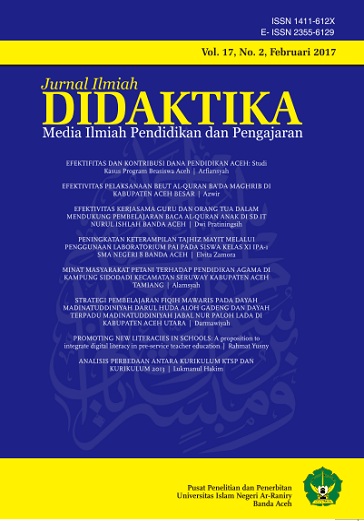PENGARUH ASPEK PENDIDIKAN, NORMATIF, DAN MEDIA SOSIAL TERHADAP KONTROL EMOSI SISWA MADRASAH ALIYAH DI ACEH
DOI:
https://doi.org/10.22373/jid.v19i2.5036Keywords:
Sadness, anger, islamic teaching, studentsAbstract
Teenage students have unpredictable emotional tendency. The unbalance of students' anger and sadness can be influenced by certain factors. In controlling the emotions, such as anger and sadness, the students of Islamic Senior High School have different ways. It is wondered that they will vent those emotions towards things that are not in accordance with religious teachings. In this regard, this research was done to know the influence of educational, normative (religious law) and also social media (internet) aspects on their emotions. Therefore, this paper is a result of a qualitative study which is aimed at finding the dominant factors causing anger and sadness, and the level of controlling ability of the emotions. The instrument used was a questionnaire with pedagogical (educational), normative, and social media approaches. Findings show that the dominant factor causing anger is that someone they respect is not being respected. On the other hand, the dominant factor causing sadness is the one they cared about were in the state of sorrow. Furthermore, the level of anger controlling ability is in very good category, with an average value of 21.13103 (range 0-30). In addition, the level of sad controlling ability is in very good category too, with an average value of 20.72414 (range 0-30).
References
Al-Qur’an Al-Karim
Abraham H. Maslow, Motivasi dan Kepribadian I, Bandung: Remaja Rosdakarya, 1993.
Aidh bin Abdullah al-Qarni, Cahaya Kemuliaan di Wajah Mereka, Jakarta: Pena Pundi Aksara, 2005.
Al-Ghazali, Kejaiban-Keajaiban Hati, Bandung: Karisma, 2005.
Ami Nurbaits, “5 Cara Mengendalikan Emosi dalam Islam.” (Online) https://konsultasisyariah.com/18243-cara-mengendalikan-emosi-dalam-Islam.html. Diakses tanggal 19/6/2019
Bijak Kata, “Cara Mengatasi Kesedihan.” (Online) http://www.bijakkata.com/2013/07/Kumpulan-motivasi-kata-mutiara-bijak-mengatasi-kesedihan.html Diakses tanggal 19/6/2019
Eizabeth B. Hurlock, Psikologi Perkembangan, Jakarta: Erlangga, 2004.
Esa Nurwahyuni, “Kefektivan Pendekatan Cognitive Behaviour Modification untuk Meningkatkan Kemampuan Mengelola Marah Bagi Remaja.” (Online) http://repository.uin-malang.ac.id/360/ Diakses Tanggal 19/6/2019
Frank J Bruno, Kamus Istilah Bahasa Indonesia, Yogyakarta: Kanisius, 1989.
Gudang Kesehatan, “8 Cara Meredam Amarah dalam Kehidupan Sehari-hari.” (Online) http://www.gudangkesehatan.com/8-cara-meredam-amarah-dalam-kehidupan-sehari-hari/ Diakses tanggal 19/6/2019
Hipno Terapi, “Mengatasi Rasa Sedih.” (Online) http://hipnoterapijakartabekasi.com/mengatasi-rasa-sedih/cara-mengatasi-dan-menghilangkan-rasa-kesedihan-dengan-hipnoterapi/Diakses tanggal 19/6/2019
Ibnu Husein, Pribadi Muslim Ideal, Semarang: Pustaka Nuun, 2004.
Irwan Prayitno, Ketika Anak Marah, Bekasi: Pustaka Tarbiyatuna, 2003.
Kartini Kartono, Psikologi Anak, Bandung: Alumni, 1979.
Klinik Hipnoterapi, “Mengatasi Emosi Marah Berlebihan.” (Online) http://hipnoterapijakartabekasi.com/mengatasi-marah-berlebihan/mengatasi-emosi-marah-berlebihan/ Diakses tanggal 19/6/2019.
M.Fauzi Rachman, Islamic Relationship (Membina Hubungan Islami dengan Allah SWT, Rasulullah SAW, Manusia, dan Alam Semesta), Jakarta: Erlangga, 2015.
Muhammad Taqi Falsafi, Anak Antara Kekuatan Gen dan Pendidikan, Bogor: Cahaya, 2002.
Mukhamad Yusuf, Masalahmu Sahabat Terbaikmu, Jogjakarta: DIVA Press, 2014.
Syaikh M. Jamaluddin Mahfud, Psikologi Anak dan Remaja Muslim, Jakarta: Pustaka kautsar, 2004.









